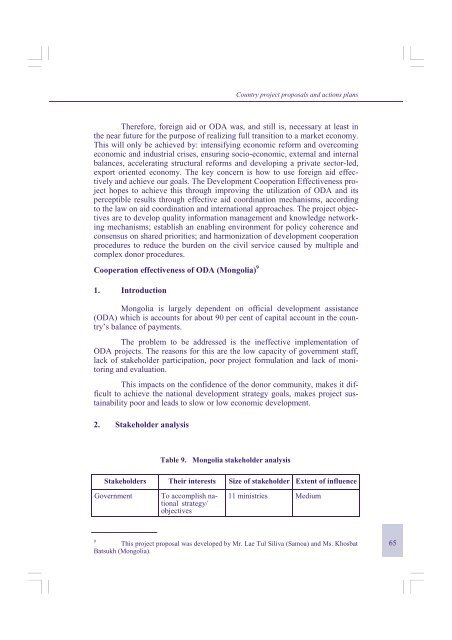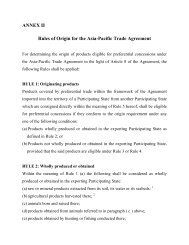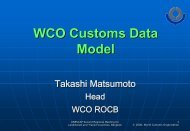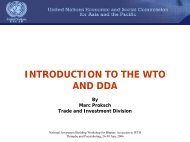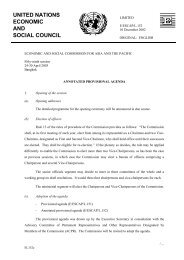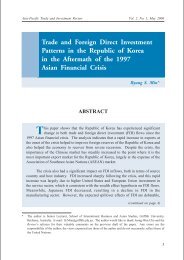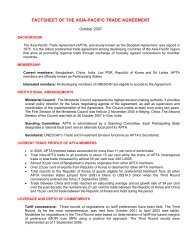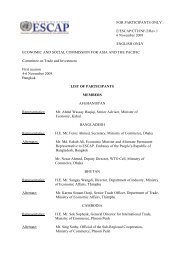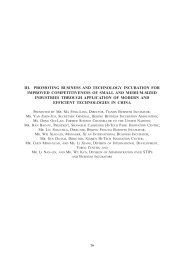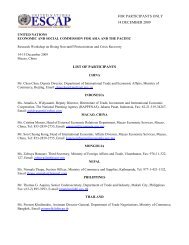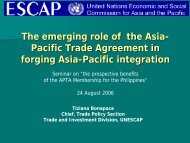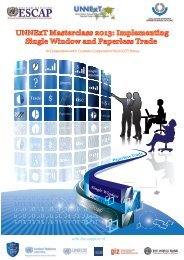Report of the Regional Workshop - Escap
Report of the Regional Workshop - Escap
Report of the Regional Workshop - Escap
You also want an ePaper? Increase the reach of your titles
YUMPU automatically turns print PDFs into web optimized ePapers that Google loves.
Country project proposals and actions plans<br />
Therefore, foreign aid or ODA was, and still is, necessary at least in<br />
<strong>the</strong> near future for <strong>the</strong> purpose <strong>of</strong> realizing full transition to a market economy.<br />
This will only be achieved by: intensifying economic reform and overcoming<br />
economic and industrial crises, ensuring socio-economic, external and internal<br />
balances, accelerating structural reforms and developing a private sector-led,<br />
export oriented economy. The key concern is how to use foreign aid effectively<br />
and achieve our goals. The Development Cooperation Effectiveness project<br />
hopes to achieve this through improving <strong>the</strong> utilization <strong>of</strong> ODA and its<br />
perceptible results through effective aid coordination mechanisms, according<br />
to <strong>the</strong> law on aid coordination and international approaches. The project objectives<br />
are to develop quality information management and knowledge networking<br />
mechanisms; establish an enabling environment for policy coherence and<br />
consensus on shared priorities; and harmonization <strong>of</strong> development cooperation<br />
procedures to reduce <strong>the</strong> burden on <strong>the</strong> civil service caused by multiple and<br />
complex donor procedures.<br />
Cooperation effectiveness <strong>of</strong> ODA (Mongolia) 9<br />
1. Introduction<br />
Mongolia is largely dependent on <strong>of</strong>ficial development assistance<br />
(ODA) which is accounts for about 90 per cent <strong>of</strong> capital account in <strong>the</strong> country’s<br />
balance <strong>of</strong> payments.<br />
The problem to be addressed is <strong>the</strong> ineffective implementation <strong>of</strong><br />
ODA projects. The reasons for this are <strong>the</strong> low capacity <strong>of</strong> government staff,<br />
lack <strong>of</strong> stakeholder participation, poor project formulation and lack <strong>of</strong> monitoring<br />
and evaluation.<br />
This impacts on <strong>the</strong> confidence <strong>of</strong> <strong>the</strong> donor community, makes it difficult<br />
to achieve <strong>the</strong> national development strategy goals, makes project sustainability<br />
poor and leads to slow or low economic development.<br />
2. Stakeholder analysis<br />
Table 9. Mongolia stakeholder analysis<br />
Stakeholders Their interests Size <strong>of</strong> stakeholder Extent <strong>of</strong> influence<br />
Government<br />
To accomplish national<br />
strategy/<br />
objectives<br />
11 ministries Medium<br />
9<br />
This project proposal was developed by Mr. Lae Tul Siliva (Samoa) and Ms. Khosbat<br />
Batsukh (Mongolia).<br />
65


